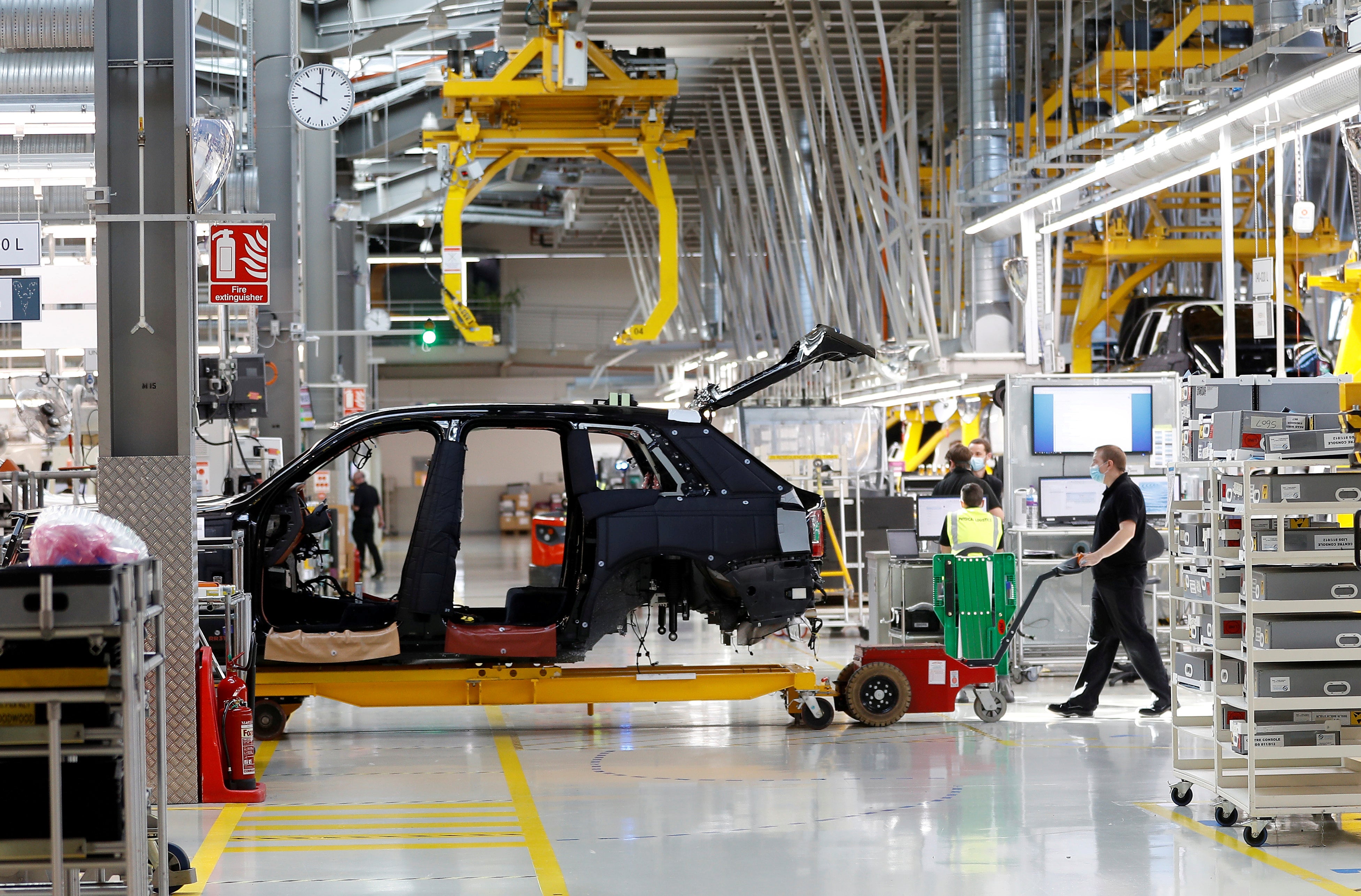Business
Forbes makes plea to UK Government after closure plans for ‘cornerstone’ plant

The Scottish Government has pledged it will “explore all options” to support ExxonMobil workers in Fife, after the energy giant announced it is to close its plant at Mossmorran.
But Scotland’s Deputy First Minister Kate Forbes said it was also “crucial” that Labour ministers at Westminster “consider what more they can do for the workers at the plant and take urgent action”.
She spoke out at Holyrood hours after ExxonMobil announced its ethylene manufacturing plant, which produces the base material for many plastics, is expected to close in February.
The move puts 179 workers directly employed at Mossmorran at risk, along with the jobs of 250 contractors – although there is the possibility of 50 staff transferring to the Fawley Petrochemical Complex almost 500 miles away in Hampshire.
In a statement, ExxonMobil said its Fife Ethylene Plant “has been a cornerstone of chemical production in the UK for 40 years”,
However, the firm added that the closure “reflects the challenges of operating in a policy environment that is accelerating the exit of vital industries, domestic manufacturing, and the high-value jobs they provide”.
ExxonMobil said: “We considered various options to continue production and tested the market for a potential buyer, but the UK’s current economic and policy environment combined with market conditions, high supply costs and plant efficiency do not create a competitive future for the site.”
Ms Forbes said she was “extremely disappointed” by the move.
Speaking at Holyrood, she said: “I wish to provide my assurance to the workforce that we will work with them and their representatives to explore all options to support them.”
She pledged the Scottish Government would now “engage constructively” with Fife Council and others to “consider all possible actions to mitigate any impact on the local economy”.
Ms Forbes also promised to convene a taskforce “to urgently consider any actions the Scottish Government, with the limited economic powers we have, could take to mitigate the impact of this decision”.
With the planned closure coming after the oil refinery at Grangemouth was shut down in April this year, the Deputy First Minister also said work to find an alternative future for this site would be expanded to include Mossmorran.
But she said the UK Government must work with her to “secure a future for the site”.
Ms Forbes said: “ExxonMobil has been clear in its announcement today that the UK’s current economic and policy environment does not create a competitive future for its site.”
Stressing that the “levers for an industrial intervention” lie with Westminster, she added: “I believe it is crucial that UK ministers consider what more they can do for the workers at the plant and take urgent action – overdue action – to address the high cost of energy which is slowly crippling industry.”
Scottish Secretary Douglas Alexander, however, said that the closure decision was “ultimately a commercial one” for the company.
“This is an incredibly difficult time for the Mossmorran workers and their families,” Mr Alexander said.
“The UK Government has explored every reasonable avenue to support the site, but the closure decision is ultimately a commercial one for Exxon, a company which is facing significant global challenges.
“Our focus now must be on supporting the workforce in the months ahead.”
Sharon Graham, the general secretary of the trade union Unite, said it was “utterly disgraceful” that the company had decided to shutter the plant.
“ExxonMobil must withdraw the closure threat and enter into meaningful negotiations with all key players to ensure the future of the plant and jobs,” she demanded.
The union’s industrial officer, Bob MacGregor, added: “Today’s news is devastating for the workers at the plant and the local community as well as the industry as a whole. Unite will do everything it can to support our members through the next few weeks.
“ExxonMobil is one of the richest companies in the world. It cannot be allowed to walk away and leave an industrial wasteland in Fife.”
Robert Deavy, a senior organiser for trade union GMB, which represents contractors on the site, called for politicians to put together a “planned and measured” transition.
“This is more grim news for workers, their families and communities but exactly how much more bad news is needed before ministers protect jobs and our country’s energy security? How many dominoes have to fall?
“Our members do not need more politicians wringing their hands or making more speeches promising just transitions. There is nothing just about what is going on and there is no transition.
“We need politicians willing to finally stand up and demand an industrial strategy that protects the UK’s crucial oil and gas while actually delivering a planned and measured transition instead of the economic carnage unfolding day by day.”
Business
Rolls-Royce profits soar after major UK and US defence orders

Rolls-Royce has announced a significant surge in its annual profit, climbing by £1 billion, alongside an upgraded financial outlook for the coming years.
The engineering powerhouse attributed this robust performance to substantial military aircraft orders and burgeoning demand for powering data centres.
The company reported an underlying operating profit of £3.5 billion for 2025, marking a 40 per cent increase from the £2.5 billion achieved in the previous year.
Underlying revenues also surpassed £20 billion over the period, representing approximately a tenth’s rise compared to 2024.
This impressive growth was fuelled by strong profit and sales across its civil aerospace, defence, and power divisions.
Rolls-Royce highlighted particularly strong demand for its defence products, securing major orders throughout 2025. The firm stated its various business units are well-positioned to capitalise on “key global trends” in the years ahead.
This included contracts worth more than £1.5 billion with the UK’s Ministry of Defence and the US’s Department of War for EJ200 and AE 2100 engines to power military aircraft.
New orders for the Eurofighter aircraft engines from Italy, Germany and Spain, as well as export agreements from Turkey, will drive production into the 2030s, it said.
Furthermore, Rolls-Royce said it was benefiting from growing demand for power generation, driven by data centres with revenues up by more than a third.
Rolls-Royce said it was now expecting underlying operating profits to increase to between £4.9 billion and £5.2 billion by 2028 following the strengthened financial performance in 2025.
This is significantly higher than the £3.6 billion to £3.9 billion range that it had previously been targeting.
Chief executive Tufan Erginbilgic said growth would not have been possible “before our transformation”, with the business making £600 million worth of cost savings since 2022.

“With our new capabilities and mindset, we have navigated challenges from supply chain to tariffs, and delivered a strong performance in 2025, all while we built the foundations for significant growth for years to come,” he said.
“Based on our 2026 guidance, we expect to deliver underlying operating profit within the prior mid-term guidance range two years earlier than planned.
“Beyond the mid-term we continue to see significant growth from existing businesses as well as from new business opportunities.”
Business
Gold Could Hit 7500 Per Ounce: Gold in ‘structural repricing phase’, could hit $6,000 in 12 months: Report – The Times of India

Gold’s long-term outlook remains bullish as global de-dollarisation, rising fiscal stress and escalating geopolitical tensions reshape the global financial order, according to a report by Motilal Oswal Financial Services Ltd (MOFSL).In its latest Precious Metals Quarterly Report, the brokerage said gold prices crossed the $5,000 per ounce mark in early 2026, marking one of the strongest long-term bull phases in modern history.The firm said gold has entered a “structural repricing phase,” signalling the beginning of a new supercycle rather than a short-term cyclical rally.
Target of $6,000 in 12 months, $7,500 medium term
MOFSL expects Comex gold to settle towards $6,000 per ounce — equivalent to around Rs 1.85 lakh per 10 grams domestically — over the next 12 months. It also sees the potential for prices to move towards $7,500 per ounce in the medium term if geopolitical and fiscal pressures intensify.“The long-term outlook for gold remains positive. As global reserves gradually diversify away from dollar-centric assets and physical supply remains constrained, gold prices are likely to stay supported around and above $5,000 per ounce,” Navneet Damani, head of research, Commodities, Motilal Oswal Financial Services Ltd, said, as quoted by news agency PTI.Damani added that the current cycle is being driven not just by inflation, but by confidence — or the lack of it — in fiscal and monetary systems.
Gold rises despite positive real rates
The report highlighted that gold continued to climb even when real interest rates were positive between 2023 and 2025 — a period when prices would typically decline.This trend indicates that investors are increasingly worried about mounting global debt levels and the long-term stability of fiscal and monetary frameworks.“Gold’s strength despite positive real interest rates shows a clear shift in investor thinking. Real returns are increasingly seen as temporary and policy-driven, which reduces the cost of holding gold and strengthens its role as a safeguard against broader financial risks,” Manav Modi, analyst – commodities, MOFSL, said.
Geopolitical tensions, supply constraints add support
According to the report, rising geopolitical tensions in Eastern Europe, the Middle East and Asia, along with renewed trade tensions and tariff-related disruptions, have heightened inflation and currency volatility, making gold more attractive as a neutral and reliable asset.Damani noted that as fiscal stress increases and questions emerge over monetary independence, gold’s role as non-sovereign money has gained prominence, leading to a structural shift in demand.The brokerage also pointed to tight global physical supply conditions supporting prices. Limited mine output, shrinking inventories across major exchanges and rising production costs have kept precious metal prices elevated.
Domestic demand and central bank buying
On the domestic front, rupee depreciation and strong retail demand have further supported gold prices. Exchange-traded funds (ETFs) have seen renewed inflows after years of decline, the report said.Central banks have remained consistent buyers, adding around 1,000 tonnes of gold annually for four consecutive years as part of efforts to diversify reserves and reduce reliance on dollar-based assets.Overall, MOFSL expects gold to remain well supported over the long term, driven by reserve diversification, constrained supply growth and ongoing global economic and geopolitical uncertainty.
Business
LSEG boosts returns for shareholders amid activist investor pressure

The London Stock Exchange Group has unveiled plans for a £3 billion share buyback amid pressure from an activist investor and as artificial intelligence fears have hammered the stock.
LSEG said it would follow £2.1 billion in buybacks made last year with another £3 billion by February next year, on top of a hike in dividend payouts.
Details of the pledge to step up returns for investors came as it reported underlying operating profits of £3.51 billion for 2025, up 10.8% or 14.7% higher on a constant currency basis.
On a bottom line basis, pre-tax profits jumped 56.5% to £1.97 billion for 2025.
Shares in the group rose as much as 5% in Thursday morning trading, in a welcome increase after the stock has been battered in recent weeks by global investor concerns over the impact of AI on its firm and data companies more widely.
Shares in the firm, which makes a significant chunk of its earnings from selling access to markets data, have slumped by nearly a third in the past year.
Activist investor Elliott Management has also built up a stake in the firm earlier this month and has reportedly been pushing for more share buybacks as it has held talks with LSEG bosses.
In the face of the recent shares slump, chief executive David Schwimmer said recent results showed “another year of very strong financial performance”.
He said: “In the fourth quarter alone, major financial institutions signed long-term contracts worth £1.9 billion to access our leading data and workflow.”
“With our LSEG Everywhere data strategy, we are positioning ourselves as the partner of choice for licensed, trusted data as the use of AI in decision-making scales – and we are seeing very positive signs of adoption,” he added.
It outlined new performance guidance for 2027 to 2029, with aims to deliver “mid to high single digit” growth in total income and further increase profitability.
Despite taking a significant stake in LSEG, the Financial Times newspaper reported earlier this week that Elliott has made assurances to the UK government over its intentions for LSEG as speculation mounted it would look to push for a break-up of the firm or for it to switch its listing to New York.
-

 Fashion1 week ago
Fashion1 week agoPhilippines expands logistics network to address supply chain issues
-

 Tech7 days ago
Tech7 days agoA $10K Bounty Awaits Anyone Who Can Hack Ring Cameras to Stop Sharing Data With Amazon
-

 Sports1 week ago
Sports1 week agoNepal wrap up T20 World Cup campaign with Scotland triumph
-

 Fashion6 days ago
Fashion6 days agoICE cotton ticks higher on crude oil rally
-

 Sports1 week ago
Sports1 week agoUSA vs. Canada is the women’s Olympic hockey rematch everyone was waiting for
-

 Business6 days ago
Business6 days agoUS Top Court Blocks Trump’s Tariff Orders: Does It Mean Zero Duties For Indian Goods?
-

 Business5 days ago
Business5 days agoEye-popping rise in one year: Betting on just gold and silver for long-term wealth creation? Think again! – The Times of India
-

 Entertainment5 days ago
Entertainment5 days agoViral monkey Punch makes IKEA toy global sensation: Here’s what it costs





